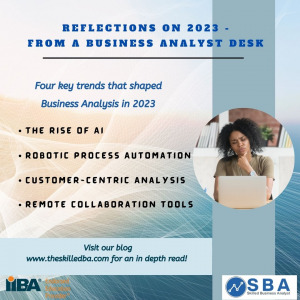
It’s that time of the year again when we get to pause, reflect, and look back on 2023. In this article, The Skilled Business Analyst presents four key trends that shaped the Business Analysis profession in 2023.
1. The rise of AI
There is no doubt that AI has changed the world of work. Business Analysts are leveraging tools such as ChatGPT to assist with requirements documentation.
• While these tools offer significant benefits, they do not replace the role of the Business Analyst.
• Business Analysts are still critical to understanding customer needs, analyzing complex business problems, and helping bridge the current state to the future state.
• The skilled business analyst will find the right mix of leveraging AI in their work where appropriate and building strong relationships with their stakeholders.
2. Robotic Process Automation
With digital transformation on most CIOs’ roadmaps, organizations are seeking to optimize their processes and minimize costs. RPA has become a strategic tool that allows for scaling down manual efforts and increasing cost-effectiveness.
• Business Analysts are at the center of identifying operational processes that are good candidates for RPA, which are typically repetitive and rule-based processes.
• Measuring the impact of RPA is critical as it provides tangible metrics to assess the effectiveness of automation initiatives.
• The skilled business analyst will identify key performance indicators and success metrics to measure the impact of RPA on efficiency and productivity.
3. Customer-Centric Analysis
The old age saying – “customers are at the heart of what we do’’, still holds true to this day. 2023 saw a shift from a product-centric mindset to a customer-centric mindset.
• Customer needs are at the forefront of business decisions.
• Business Analysts and product teams are actively seeking out customer feedback and using customer-centric insights to make ongoing improvements to products, services, and processes.
• The skilled business analyst will understand the customer journey from awareness to purchase and beyond. This involves identifying touchpoints, pain points, and opportunities to enhance the overall customer experience.
4. Remote collaboration tools
In 2023, remote collaboration tools continued to evolve the way business analysts operate by allowing seamless communication and information sharing.
• Remote work / hybrid work is here to stay. As such, a variety of tools, ranging from video conferencing tools to project management tools and document collaboration tools, are being used.
• Effective collaboration goes beyond personal preferences, ensuring the chosen collaboration tools not only align with the BA’s workflow but are also user-friendly for stakeholders.
• The skilled business analyst will select tools that cater to both their own needs and those of stakeholders, promoting smooth collaboration and understanding.
Wishing you a year filled with exciting challenges, rewarding breakthroughs, and a sense of fulfillment in every project you undertake. Happy New Year!
Yours in Analysis
Tendai

